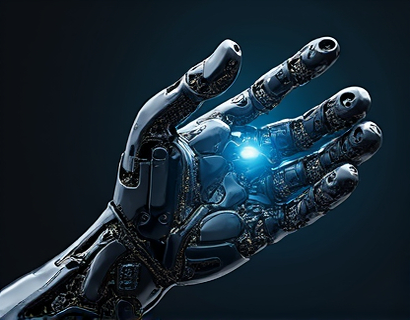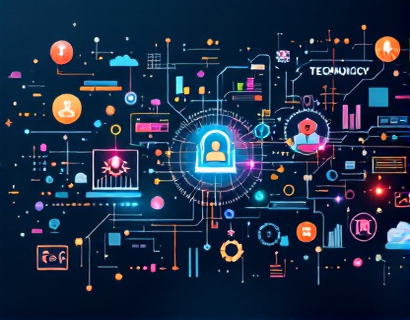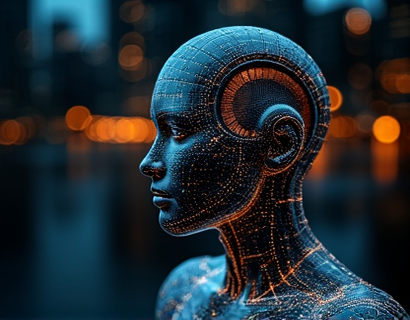Revolutionizing Digital Transformation: The Synergy of Crypto and AI
The intersection of cryptocurrency and artificial intelligence (AI) is ushering in a new era of digital transformation, redefining how we interact with applications and services. This convergence is not just a technological advancement but a paradigm shift that promises to enhance efficiency, security, and user experience across various industries. As we delve into the latest advancements in tech-driven applications, it becomes evident that the synergy between crypto and AI is set to revolutionize the digital landscape.
Understanding the Basics: Cryptocurrency and AI
To fully appreciate the impact of this convergence, it's essential to understand the fundamental concepts of both cryptocurrency and AI. Cryptocurrency, often referred to as digital or virtual currency, operates on a decentralized network known as a blockchain. This technology ensures transparency, security, and immutability, making it an ideal medium for transactions. On the other hand, AI refers to the simulation of human intelligence processes by machines, particularly computer systems. These processes include learning (the acquisition of information and rules for using it), reasoning (using rules to reach approximate or definite conclusions), and self-correction.
The Convergence: How Crypto and AI Complement Each Other
The integration of AI into cryptocurrency systems brings about significant improvements. AI algorithms can analyze vast amounts of data to predict market trends, optimize trading strategies, and enhance security measures. For instance, machine learning models can identify patterns in historical data to forecast price movements, providing traders with valuable insights. Additionally, AI-driven smart contracts can automate and enforce contractual obligations with precision, reducing the need for intermediaries and lowering transaction costs.
Conversely, cryptocurrency provides a unique environment for AI to thrive. The decentralized and transparent nature of blockchain technology ensures that AI models can operate without the risk of data tampering or censorship. This synergy creates a feedback loop where AI enhances the functionality of cryptocurrency systems, and the data generated by these systems fuels further AI advancements.
Enhancing Security with AI and Crypto
Security is a paramount concern in the digital world, and the combination of AI and cryptocurrency offers robust solutions. AI can detect and mitigate cyber threats more effectively than traditional methods. By analyzing network traffic and user behavior, AI systems can identify anomalies and potential security breaches in real-time. In the context of cryptocurrency, this means enhanced protection against hacking, fraud, and other malicious activities.
Blockchain's inherent security features, such as cryptographic hashing and consensus mechanisms, are further strengthened by AI. For example, AI can optimize the consensus process, making it more efficient and resistant to attacks. Moreover, AI-driven identity verification and authentication processes can ensure that only authorized users access sensitive information, adding an extra layer of security.
Optimizing User Experience through AI and Crypto
The user experience (UX) is a critical factor in the success of any digital service. The integration of AI and cryptocurrency can significantly enhance UX by personalizing interactions and streamlining processes. AI algorithms can analyze user data to provide tailored recommendations and services, making the experience more intuitive and user-friendly. For instance, a crypto-based platform can use AI to suggest investment strategies based on a user's risk profile and market conditions.
Furthermore, AI can simplify complex crypto operations, making them accessible to a broader audience. For example, AI-powered chatbots can assist users in navigating the platform, answering queries, and providing guidance on transactions. This not only improves user satisfaction but also reduces the learning curve associated with crypto technologies.
Innovative Applications in Various Industries
The convergence of AI and cryptocurrency is not limited to the financial sector. Its applications span across multiple industries, each benefiting from the unique capabilities of both technologies. Here are some key areas where this synergy is making a significant impact:
- Supply Chain Management: AI can optimize supply chain operations by predicting demand, reducing costs, and improving efficiency. Cryptocurrency can facilitate seamless and secure transactions between suppliers and buyers, eliminating the need for intermediaries.
- Healthcare: AI-driven analytics can enhance patient care by predicting disease outbreaks and personalizing treatment plans. Cryptocurrency can ensure secure and private sharing of medical data, while smart contracts can automate insurance claims and payments.
- Real Estate: AI can analyze market trends and property data to provide insights for investors and buyers. Cryptocurrency can streamline real estate transactions, reducing transaction costs and increasing transparency through blockchain-based property records.
- Energy Sector: AI can optimize energy consumption and distribution, while cryptocurrency can enable peer-to-peer energy trading, allowing consumers to buy and sell excess energy directly.
These applications demonstrate the versatility and potential of AI and cryptocurrency to drive innovation and efficiency across various sectors.
Challenges and Considerations
Despite the numerous benefits, the integration of AI and cryptocurrency also presents challenges that need to be addressed. One of the primary concerns is regulatory compliance. The decentralized nature of cryptocurrency and the rapidly evolving AI landscape make it difficult for regulators to keep pace. Ensuring that these technologies comply with existing laws and regulations is crucial to their widespread adoption.
Another challenge is the technical complexity involved in developing and maintaining AI-driven crypto systems. Developers need to possess a deep understanding of both technologies to create robust and secure solutions. Additionally, the ethical implications of AI, such as bias and privacy concerns, must be carefully managed to build trust and ensure responsible use.
The Future of Digital Transformation
The future of digital transformation is intrinsically linked to the continued growth and integration of AI and cryptocurrency. As these technologies mature, we can expect to see even more innovative applications and use cases. The key lies in fostering collaboration between tech companies, regulators, and the broader community to address challenges and unlock the full potential of this synergy.
For tech enthusiasts and professionals, staying informed about the latest advancements in AI and cryptocurrency is essential. By embracing these technologies, we can drive meaningful change and create a more efficient, secure, and user-friendly digital world.










































